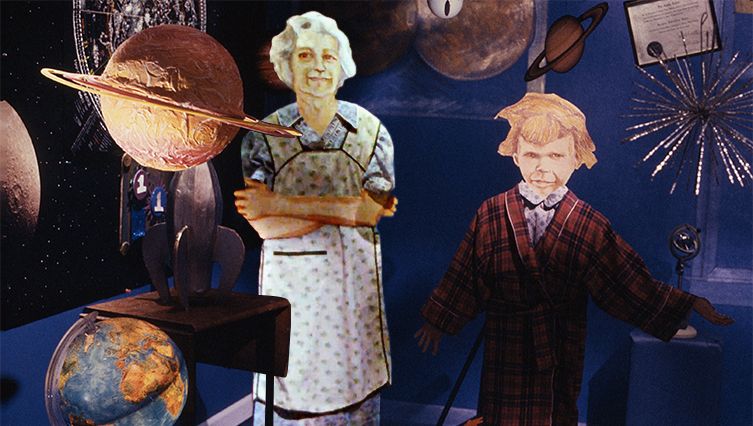It is rare for a filmmaker to be present in every single frame of a film, to envelop themselves in every speck of celluloid and convey themselves in their own art; yet somehow Jan Oxenberg does just that in a mere 83 minutes. As she grapples with death and decay, looking back and moving forward, portraying reality and embracing theatricality, Oxenberg does not simply produce a movie, but actually offers us a piece of her heart.
Originally released in 1991,“Thank You and Good Night” was restored by IndieCollect and acts as a love letter to the filmmaker’s grandmother, Mae Joffe. The film finds Oxenberg reminiscing on her grandmother’s life and the time they spent together all the while questioning what it means for someone to die, to genuinely embrace finality and vanish. The concepts at play are rather heady and severe, but Oxenberg’s decision to integrate a sense of fantasy to the picture renders them digestible and stirring.
In choosing to infuse the film with a childlike wonder, a sense of nostalgia blossoms that illustrates the beautiful dynamic between her existence as a child being attached to a notion of care being bestowed by her grandmother. Thus, the film gains a dreaminess that sees reality and fantasy intersecting across time, rendering each memory a particular palpability that’s accentuated by Oxenberg’s fantastical flairs. It’s not the same to have a teary-eyed individual reminisce on someone’s life as it is to have a cardboard cutout of a child experiencing what it’s like to journey through life.
In that sense, the film acts as a kindred spirit to works like “The Little Prince” and “World of Tomorrow” that use the wide-eyed, meandering minds of children to evaluate life at large. In confronting death from such a youthful perspective, a sense of displacement arises, as the idea of experiencing life’s many wonders for the first time plays out within a narrative that sees life coming to an end. Thus, the film feels alive because it’s not looking back, instead accelerating toward death at the same pace as everyone does, with the film’s runtime actually representing a lifetime.
The only way to describe this film is as an expressionistic eulogy. It transcends documentary filmmaking and doesn’t quite fit the patterns of traditional narrative works. Constantly conflating footage from real life with fantastical visions that see cardboard cutouts of Oxenberg and her grandmother, Joffe, going to Coney Island or traversing deep space, the movie’s sense of direction is dictated by the film’s emotional swelling rather than a linear narrative. Each scene acts as an emotional appeal that pulls you in as opposed to an agitation of the plot to keep you involved. As “Thank You and Good Night” hops from one personality to another and trades one emotion for the next all the while substituting reality for fantasy and vice-versa, you never feel lost. Thus, a viewer is rendered a pulse-taker, fully aware of what dictates alternating beats; what makes the bloodstream tick, slow down or stop.
To put it in less biological terms, “Thank You and Good Night” operates like a wave: it fades in-and-out, carrying a certain weight that fluctuates between destruction, reassurance, serenity or dolefulness at different times throughout the film. Doing so, the film engages in an emotional clashing that cascades towards a rapturous finale. But there’s one quality that’s sustained amidst the flux: love. Despite dwelling on morose memories and nihilistic projections, Oxenberg always manages to sustain a sense of love towards life that’s perfectly accentuated by the film’s cosmic finale.
The pathos of “Thank You and Good Night” resonates all the same after all these years. A lot has happened in the last 30 years in terms of documentarian remembrance, whether that be in the melancholy of “Dear Zachary” or the vivacity of “Varda by Agnès, no film has ever come close to capturing the uniqueness of Oxenberg’s cinematic grammar. This uniqueness is highlighted in the way in which she not only shares her trauma, but reinvents it in the process of filmmaking as well. In that way, the film feels like it’s constantly edging towards a sense of renewal that it imparts upon viewers involved in this personal, albeit universal, story it chooses to portray.
Oxenberg’s experience is everyone’s. As she comes to terms with the passing of her grandmother and we, as an audience, come to terms with Oxenberg’s process of grievance, a poignant moment to recollect on death is presented. “Thank You and Good Night” not only acts as a eulogy in remembering Mae Joffe’s legacy, but also acts as a way of coming to terms with the fact that she’s passed away and one day, we’ll all die too.
Email Nicolas Pedrero-Setzer at [email protected].


























































































































































